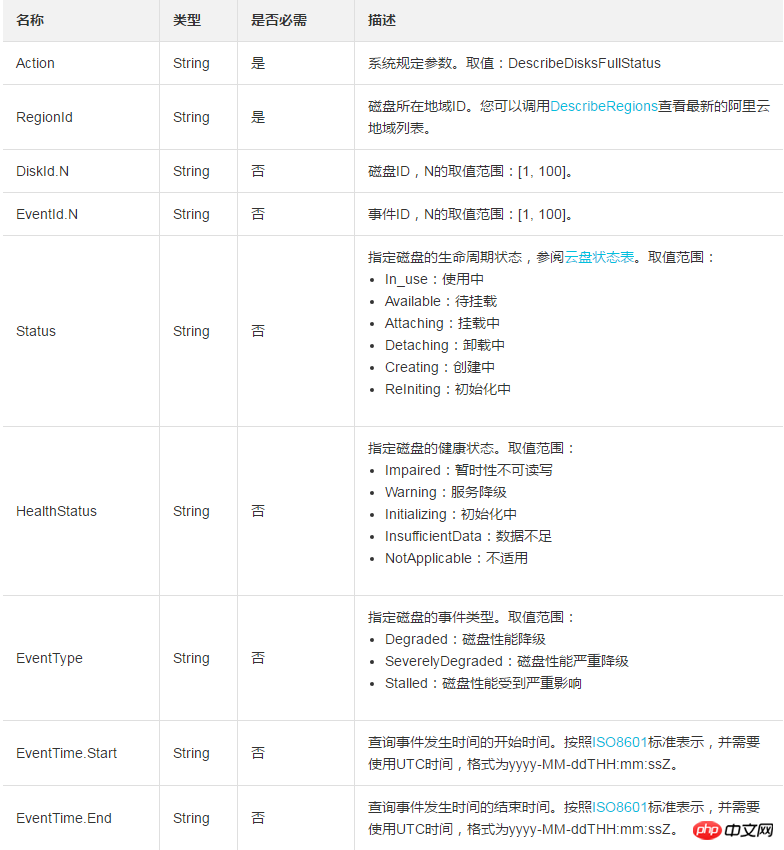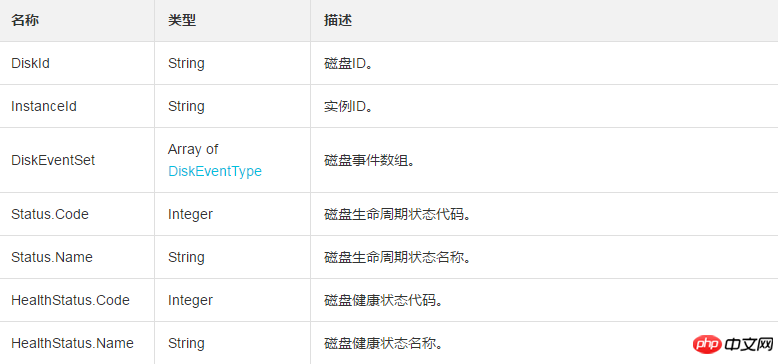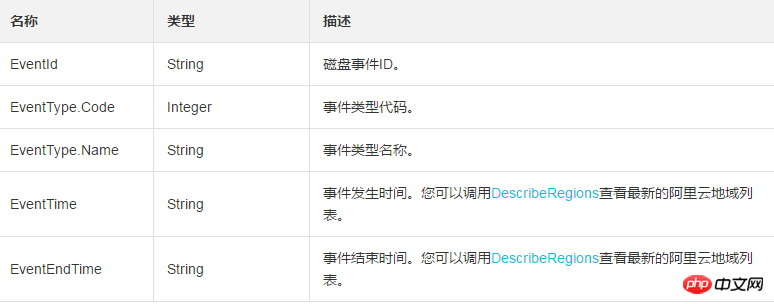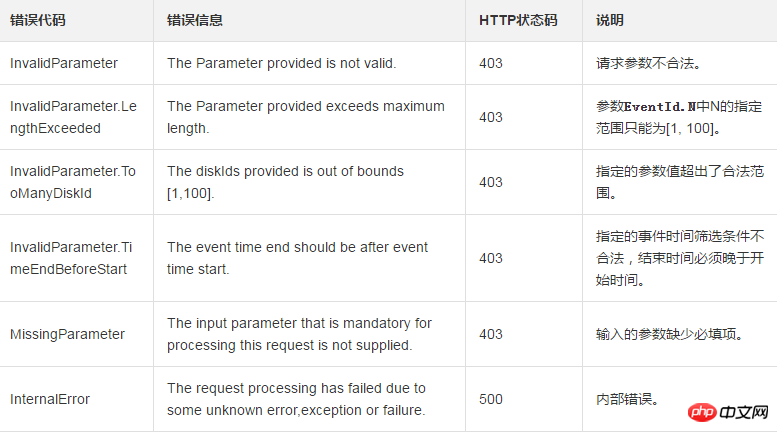
This article introduces how to query all status information of one or more disks, and focuses on the specific steps. The content of this article is compact, and I hope you can gain something from it.
DescribeDisksFullStatus
Description
All status information of the disk includes disk life cycle (Status), disk health status (HealthStatus ) and disk event type (EventType).
Since the release time of disk-related events, the planned execution time of the event and the actual execution time of the event are the same, if you specify a period of time [EventTime.Start, EventTime.End], you can query the events that occurred during this period all historical events. Currently, you can query historical events up to the last week.
Request parameters

##Return parameters

Data type DiskFullStatusType
Data type DiskEventType 
Example
Request example
https://ecs.aliyuncs.com/?Action=DescribeDisksFullStatus &RegionId=cn-hangzhou &<公共请求参数>
Normal return example
XML format
<DescribeDisksFullStatusResponse>
<DiskFullStatusSet>
<DiskFullStatusType>
<DiskEventSet>
<DiskEventType>
<EventId>e-event1</EventId>
<EventType>
<Code>7</Code>
<Name>Stalled</Name>
</EventType>
<EventTime>2018-05-08T02:43:10Z</EventTime>
</DiskEventType>
</DiskEventSet>
<DiskId>d-disk1</DiskId>
<InstanceId>i-instance1</InstanceId>
<HealthStatus>
<Code>128</Code>
<Name>Impaired</Name>
</HealthStatus>
<Status>
<Code>129</Code>
<Name>Available</Name>
</Status>
</DiskFullStatusType>
<DiskFullStatusType>
<DiskEventSet>
<DiskEventType>
<EventId>e-event2</EventId>
<EventType>
<Code>1</Code>
<Name>Degraded</Name>
</EventType>
<EventTime>2018-05-06T02:43:10Z</EventTime>
<EventEndTime>2018-05-06T02:48:52Z</EventEndTime>
</DiskEventType>
</DiskEventSet>
<DiskId>d-disk2</DiskId>
<InstanceId>i-instance2</InstanceId>
<HealthStatus>
<Code>64</Code>
<Name>Warning</Name>
</HealthStatus>
<Status>
<Code>0</Code>
<Name>Ok</Name>
</Status>
</DiskFullStatusType>
</DiskFullStatusSet>
<PageNumber>1</PageNumber>
<PageSize>10</PageSize>
<RequestId>1A8B4B27-8B2D-XXXX-XXXX-0F64DBE4C211</RequestId>
<TotalCount>2</TotalCount>
</DescribeDisksFullStatusResponse>JSON format
{
"DiskFullStatusSet": {
"DiskFullStatusType": [
{
"DiskEventSet": {
"DiskEventType": [
{
"EventId": "e-event1",
"EventType": {
"Code": "7",
"Name": "Stalled"
},
"EventTime": "2018-05-08T02:43:10Z"
}
]
},
"DiskId": "d-disk1",
"InstanceId": "i-instance1",
"HealthStatus": {
"Code": 128,
"Name": "Impaired"
},
"Status": {
"Code": 129,
"Name": "Available"
}
},
{
"DiskEventSet": {
"DiskEventType": [
{
"EventId": "e-event2",
"EventType": {
"Code": "1",
"Name": "Degraded"
},
"EventTime": "2018-05-06T02:43:10Z",
"EventEndTime": "2018-05-06T02:48:52Z"
}
]
},
"DiskId": "d-disk2",
"InstanceId": "i-instance2",
"HealthStatus": {
"Code": 0,
"Name": "Ok"
},
"Status": {
"Code": 129,
"Name": "Available"
}
}
]
},
"PageNumber": 1,
"PageSize": 10,
"RequestId": "1A8B4B27-8B2D-XXXX-XXXX-0F64DBE4C211",
"TotalCount": 2
}Exception return example
XML format
<Error>
<RequestId>C38E0D94-C18B-44F3-8C05-6E35BE334086</RequestId>
<HostId>ecs.aliyuncs.com</HostId>
<Code>MissingParameter</Code>
<Message>The input parameter that is mandatory for processing this request is not supplied.</Message>
</Error>JSON format
{
"RequestId": "1A8B4B27-8B2D-XXXX-XXXX-0F64DBE4C211",
"HostId": "ecs.aliyuncs.com"
"Code": "MissingParameter"
"Message": "The input parameter that is mandatory for processing this request is not supplied."
}Error code
The following are error codes unique to this interface. For more error codes, please visit the API Error Center.
The above is the detailed content of How to query all status information of one or more disks. For more information, please follow other related articles on the PHP Chinese website!